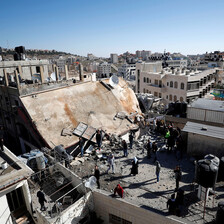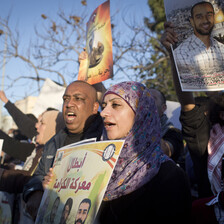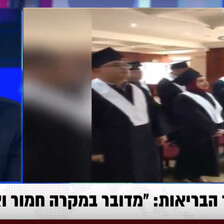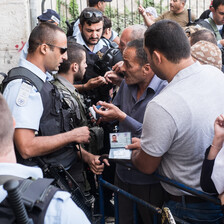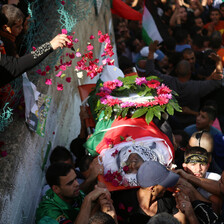The Electronic Intifada Jerusalem 22 October 2015

A relative holds a banner showing Bahaa Alayan at the slain youth’s family home in the Jabal al-Mukabir neighborhood of occupied Jerusalem on 17 October.
APA images“Do not make me a number you will remember today and forget tomorrow,” wrote Bahaa Alayan in a Facebook post titled “The ten commandments of a martyr.”
That post, which Bahaa wrote in December 2014, was a trenchant critique of how Palestinian media, political organizations and society treat martyrs and their legacies. Bahaa did not want martyrs to become numbers or their images be emblazoned on posters; he did not want the legacies of martyrs to be co-opted by factions.
He did not want them to be idolized or turned into icons, for he belongs to a generation that has revolted against these ideas. Nor did he want the media to exhaust the mothers of martyrs with questions that only seek to draw pity and sympathy.
Nearly a year after writing that post, the 23-year-old Palestinian community organizer, graphic designer, scout leader and political activist was extrajudicially executed by Israeli police for an alleged involvement in a 13 October stabbing attack in a bus in Armon HaNatziv, a Jewish-only settlement built on land confiscated from Jabal al-Mukabir, Alayan’s neighborhood in occupied East Jerusalem.
Bahaa’s alleged accomplice, Bilal Ghanem, has been detained incommunicado ever since, according to his family. They do not even know where he is being held.
After Bahaa’s killing, his “ten commandments” were widely circulated by Palestinians on social media and were even referenced in a Time magazine article.
Compelled by despair?
The nagging question for anyone who knew Alayan or read about him was: what led him to risk his life and go on a mission that would likely end in his execution, if we are to believe the Israeli assertion that he was one of the assailants?
Conventional wisdom says that freedom fighters risk their lives because they have nothing to lose and that they are compelled by despair.
But Bahaa Alayan had a lot to lose. He had a loving family. He ran a press which printed covers of books and magazines, postcards and posters that Alayan designed himself. He was a founder of the Local Youth Initiative in Jabal al-Mukabir, a group that sought to offer local children and young adults a free space to express themselves.
He was an avid reader who helped establish the first public library in the neighborhood. He was the leader of the Jabal al-Mukabir boy scout troop and trained guides in the neighborhood’s girl scouts troop as well.
“He was not just our leader and trainer; he was like a brother to us,” said Baraa, a 16-year-old guide with the local girl scouts who wanted her last name withheld.
“His message was that scouting is not just about marching in the streets and banging on a drum. It’s about commitment, solidarity, helping those in need and implanting the values of freedom and togetherness,” she added.
The scouts have traditionally been dominated by boys and men, particularly so in Jerusalem. Compelled to change this, Bahaa and his friends founded the first all-female troop.
Because of prevailing conservatism, the girls still cannot march in the city’s streets and their activities are restricted to schools, but as another girl scout, Malak, said, “we definitely want to march in the streets. Bahaa always taught us that nothing is impossible.”
Reading chain
On 16 March 2014, Alayan, along with his colleagues at the Jabal al-Mukabir Local Youth Initiative, organized a human reading chain around the walls of Jerusalem’s Old City, starting at the eastern Damascus Gate.
The group looked for a way to mark the first anniversary of the inauguration of the first public library in their neighborhood. The idea of the longest-ever human reading chain was thus born, but the organizers needed to manage expectations to avoid disappointment in case of its failure.
Organizing any public Palestinian activity in Jerusalem is never easy — and holding one in the Old City is a tall order.
“At the [beginning], we were hoping to be registered in the Guinness record books by forming the longest chain of readers. But after more than four months of hard work, we realized that we are not even interested in records anymore,” Hussam Alayan, Bahaa’s 25-year-old brother, told the Electronic Intifada.
“We wanted to break the wall of fear that is somehow related to Damascus Gate. We wanted to show that it’s possible to assemble at Damascus Gate,” Hussam added.
Hussam, a social worker, was arrested after his brother’s killing. He was detained for six days and then put on house arrest earlier this week — an act of collective punishment as no charges were filed, according to the family.
The reading chain brought together thousands of Palestinians, but the message wasn’t solely to foster a love of reading among local youth. It was also a political statement — a statement that Palestinians can reclaim Damascus Gate as a part of their national identity and offer a variety of forms to resist Israel’s attempts to impose its hegemony over the city.

Palestinians gather to participate in a reading chain at Jerusalem’s Old City in March 2014.
APA imagesThe action assembled people from Jerusalem as well as cities and villages inside present-day Israel. Palestinians from elsewhere in the occupied West Bank and from Gaza could not participate because Israel does not allow them access to Jerusalem.
But the entirety of Palestine was represented through the books carried and read by the attendants.
The chain was followed by a march from Damascus Gate to the nearby Salah al-Din Street.
Bahaa and Hussam Alayan proved that one does not need massive funding in order to be creative and to mobilize a great number of people.
Palestinians often regret the disappearance of social solidarity and volunteerism.
Instead of complaining, Bahaa and his friends revived this spirit and propelled others to come forward, take responsibility and not wait for foreign funding to trickle in.
Resist and reject
Bahaa and his friends actively resisted the domination by foreign non-governmental organizations of Palestinian activism since the Oslo accords. They vehemently rejected foreign funding because it imposes agendas that contravene their values and principles — chief among them the liberation of Palestine.
They believe that you cannot separate cultural activity from the political context.
“Any cultural activity that we carry out sends a political message of resilience, maintaining our Palestinian identity and opposing any normalization with the Israeli occupation in all of its arms,” Aya, an Arabic teacher and Bahaa’s colleague at the youth initiative, told The Electronic Intifada.
“For years, the Jerusalem occupation municipality has tried to establish a community center in Jabal al-Mukabir that aims to pacify the youth and brainwash them through extracurricular activities,” Aya said.
Community centers founded by the Israeli-controlled municipality actively work to depoliticize Palestinian youth. They focus on providing education services and “women’s empowerment” activities, while claiming to support rights to education and social services — but those rights never include freedom from occupation.
These activities aim to appease the Palestinian public while sugar-coating colonialism.
In other words, they are the “local” arm of the occupation municipality and, according to an exposé by journalist Hanadi Qawasmi, some of their managers do not hesitate to say that they aim to stop rock-throwing, a form of resisting Israel’s occupation..
In Jerusalem, Qawasmi reports, there are eight community centers that belong to the municipality and receive financial assistance from the Israeli government.
Jabal al-Mukabir and Silwan are among the neighborhoods that continue to resist the establishment of those centers by starting their own.
Such independent Palestinian centers include the youth initiative in Jabal al-Mukabir and the Madaa Center in Silwan.
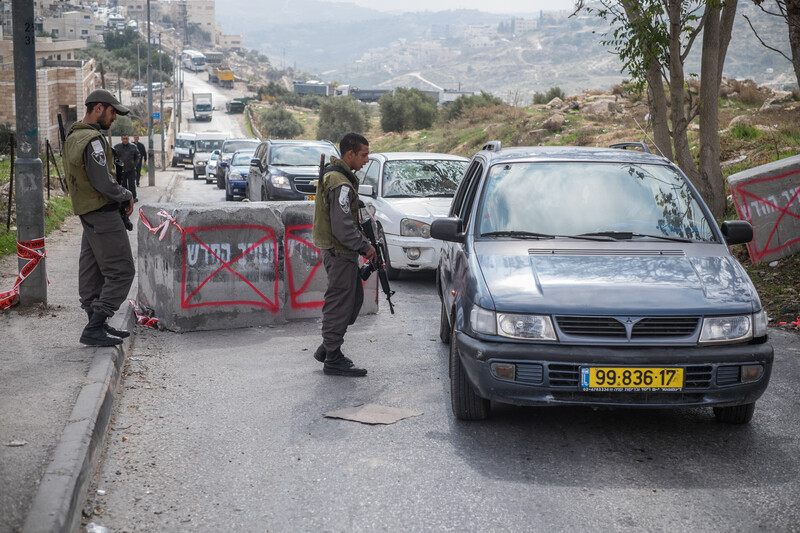
Israeli forces stop Palestinian motorists exiting Jabal al-Mukabir in November 2014.
ActiveStills“In Jabal al-Mukabir we defiantly fought against creating a community center in our village and ours is one of the few Jerusalemite villages that has thwarted this idea, despite the continuous attempts by the occupation municipality,” Aya added.
To set up their youth initiative, Bahaa and his friends restored a neglected building belonging to one of the schools in the neighborhood. When they first entered the building, it was so dirty that they couldn’t even sit on the chairs. Three years on, the place has become a comfortable space where youth can read and watch films, among other activities.
Jabal al-Mukabir is one of the poorest neighborhoods in the Jerusalem area. In addition to the settlements built on its land, the construction of Israel’s wall has also led to massive land confiscation, isolating the neighborhood from the rest of Jerusalem.
Dreamer
“Bahaa was a dreamer,” said his father Muhammad Alayan, a lawyer and author. And it was through working with others to create change where Bahaa could articulate his dreams. But it was only after his son’s death last week that his father discovered the scope of his son’s impact.
“As a son, he was the closest to me of all my children. He showered me with care and attention whenever he felt I was unwell,” Muhammad remarked.
“But he had his own social circle and we rarely discussed politics together. After his death, I googled his name and found dozens of articles written about him. I saw him in people’s words,” he said.
Muhammad believes that his son’s work will continue to live on in the children he trained in the scouts and in his friends who organized with him in the youth initiative. He also described Bahaa as emblematic of an entire generation, a generation that has dared to dream and act.
“Our generation has failed those youth,” he said. “We failed to protect our children and to give them hope. We allowed the revolution to be hijacked by a corrupt authority and we blessed those who brought the Oslo accords after the first intifada. Bahaa’s generation is revolting against us and these youths are the ones who should be the leaders. It is their time.”
Present
As Muhammad spoke, a group of girl scout guides whom Bahaa trained came to pay respect.
“Bahaa will be present with us whenever we bang a drum,” Baraa said.
The girls have a lot of work to do. As part of their activities in the scouts, they will have to think of ways to help the traumatized children of Jerusalem release their fears. They are convinced that continuing this work is the best tribute they can give Bahaa Alayan.
What stood out among all of those who knew and loved Bahaa is their respect for his choice despite the pain it inflicted on them. The Alayan family is now threatened with a punitive home demolition under a policy that has been “fast-tracked” by the Israeli government in recent weeks.
Israeli inspectors have already come to take measurements of the house.
However, for Muhammad Alayan, home is not just stones and cement.
“If they demolish this home, I know that I can call every single house in Jerusalem home. This collective punishment doesn’t scare us. Rather, it just proves that this idea of a unified Jerusalem as Israel’s capital is a charade,” he said.
This charade was laid bare by Bahaa Alayan and his generation, the generation that was born after Oslo and took the decision to upend it, not waiting for the leaders to give the orders.
Budour Youssef Hassan is a Palestinian writer and law graduate based in occupied Jerusalem. Blog: budourhassan.wordpress.com. Twitter: @Budour48
